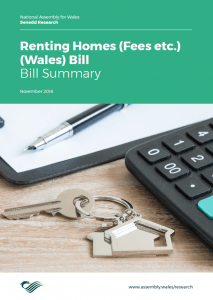On Tuesday, 6 November, the Assembly will debate the general principles of the Renting Homes (Fees etc.) (Wales) Bill.
The Bill will prohibit all fees connected to granting, renewing or continuing a standard occupation contract except those explicitly permitted by the Bill. Standard occupation contracts is not a term many people will be familiar with at the moment, but they will replace assured shorthold tenancies when the Renting Homes (Wales) Act 2016 is commenced, probably in 2019.
The Welsh Government’s own research suggests that most letting agents charge fees to tenants for a range of services including for credit checks, inventories and general administration fees. The Bill does not list all payments that are prohibited (producing an exhaustive list would be very difficult), but instead lists the payments that are allowed – known as permitted payments. The only permitted payments in the Bill are the rent, a security deposit, a holding deposit limited to a week’s rent and default payments. Default payments can cover things such as the late payment of rent and the cost of replacing keys. The Bill will also allow the Welsh Government to set a cap on the level of security deposits at some point in the future, if it thinks it is necessary, and to amend existing legislation that requires agents to display their fees to both tenants and landlords (the Consumer Rights Act 2015).
The Equality, Local Government and Communities Committee has carried out an inquiry into the general principles of the Bill. It published its report and recommendations on Friday 26 October. The Committee took evidence from a range of stakeholders and heard contrasting views on the merits of the legislation. While tenant groups, advice agencies and other stakeholders who work with tenants in the private rented sector were supportive of the Bill in many respects, witnesses representing letting agents and landlords did not think the Bill would achieve the Welsh Government’s aims. Tenant groups highlighted the financial barrier that fees can pose to accessing or moving within the private rented sector and saw the Bill as a positive development in tackling that issue. However, letting agents and landlords pointed to the likelihood of increased rents and a potentially negative economic impact on the letting agency sector, including job losses.
The Committee supported the general principles of the Bill, however, its report does highlight issues of concern and makes a number of recommendations. Some of the concerns it highlights relate to the effectiveness of the enforcement provisions, including the level of financial penalties, and the need to ensure that where prohibited payments are taken, the Bill should make it as straightforward as possible for these to be repaid. The Committee also saw an important role for Rent Smart Wales in making implementation of the legislation effective.
The Committee’s full report and recommendations are available on the Bill’s homepage. The Research Service has also produced a short Bill Summary that provides an overview of the policy background and a section by section guide to the Bill.
This paper provides a summary of the Renting Homes (Fees etc.) (Wales) Bill.
New Publication: Renting Homes (Fees etc.) (Wales) Bill (PDF, 1015KB)
Article by Jonathan Baxter, National Assembly for Wales Research Service







